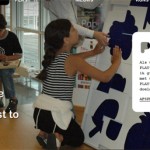Got an e-mail from Eveline Wawou this week - she represents artists that make art objects…
Art as a permission to slow down perception
Googling ‘somatic knowledge’ I came across the book “The Arts and the Creation of Mind” by Elliot Eisner Quote page 4/5:
“The arts have an important role to play in refining our sensory sytem and cultivating our imaginative abilities. Indeed, the arts provide a kind of permission to pursue qualitative experience in a particularly focused way and to engage in the constructive exploration of what the imaginative process may engender. In this sense, the arts, in all their manifestations, are close in attitude to play. Constraints on the imagination are loosened. In the arts, in the West at least, permission is provided to explore, indeed to surrender, to the impulsions the work sends to the maker, as well as those sent from the maker to the work. We see this perhaps most vividly when we watch preschoolers engaged in play. It is during this period that children take special pleasure in the sheer exploriation of the sensory potential of the materials they use. It is at this time that their imaginative abilities, uninhibited by the constraints of culture, make it possible for them to convert a stick of wood into a plane that can fly, a sock into a doll they can cuddle, or an array of lines drawn so they stand for daddy. For young children the sensory world is a source of satisfaction, and imagination a source of exploratory delight. And it is these inclinations towards satisfaction and exploration that enlightened educators and partents wish to sustain rather than to have dry up under the relentless impact of ‘serious’ academic schooling”.
“Imagination, that form of thinking that engenders images of the possible, also has a critically important cognitive function to perform aside from the creation of possible worlds. Imagination also enables us to try things out – again in the mind’s eye – without the consequences we might encounter if we had to act upon them emperically. It provides a safety net for experiment and rehearsal”.
“As for sensibility, the arts invite us to attend to the qualities of sound, sight, taste, and touch so that we experience them; what we are after in the arts is the ability to perceive things, not merely to recignize them. We are given permission to slow down perception, to look hard, to savor the qualities that we try, under normal conditions, to treat so efficientlo that we hardly notice they are there.”
| « Somatic knowledge and the body as a ‘slow mind’ | <-- previous post | next post --> | The Linen Closet » |
|---|








